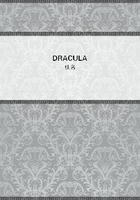
第73章
Everything is, however, now reopened, and what is to be the end God only knows. I have an idea that Van Helsing thinks he knows, too, but he will only let out enough at a time to whet curiosity.
He went to Exeter yesterday, and stayed there all night.
Today he came back, and almost bounded into the room at about half-past five o'clock, and thrust last night's "Westminster Gazette" into my hand.
"What do you think of that?" he asked as he stood back and folded his arms.
I looked over the paper, for I really did not know what he meant, but he took it from me and pointed out a paragraph about children being decoyed away at Hampstead. It did not convey much to me, until I reached a passage where it described small puncture wounds on their throats.
An idea struck me, and I looked up.
"Well?" he said.
"It is like poor Lucy's."
"And what do you make of it?"
"Simply that there is some cause in common. Whatever it was that injured her has injured them." I did not quite understand his answer.
"That is true indirectly, but not directly."
"How do you mean, Professor?" I asked. I was a little inclined to take his seriousness lightly, for, after all, four days of rest and freedom from burning, harrowing, anxiety does help to restore one's spirits, but when I saw his face, it sobered me.
Never, even in the midst of our despair about poor Lucy, had he looked more stern.
"Tell me!" I said. "I can hazard no opinion. I do not know what to think, and I have no data on which to found a conjecture."
"Do you mean to tell me, friend John, that you have no suspicion as to what poor Lucy died of, not after all the hints given, not only by events, but by me?"
"Of nervous prostration following a great loss or waste of blood."
"And how was the blood lost or wasted?" I shook my head.
He stepped over and sat down beside me, and went on, "You are a clever man, friend John. You reason well, and your wit is bold, but you are too prejudiced. You do not let your eyes see nor your ears hear, and that which is outside your daily life is not of account to you.
Do you not think that there are things which you cannot understand, and yet which are, that some people see things that others cannot?
But there are things old and new which must not be contemplated by men's eyes, because they know, or think they know, some things which other men have told them. Ah, it is the fault of our science that it wants to explain all, and if it explain not, then it says there is nothing to explain.
But yet we see around us every day the growth of new beliefs, which think themselves new, and which are yet but the old, which pretend to be young, like the fine ladies at the opera. I suppose now you do not believe in corporeal transference. No? Nor in materialization. No? Nor in astral bodies. No? Nor in the reading of thought. No? Nor in hypnotism. . ."
"Yes," I said. "Charcot has proved that pretty well."
He smiled as he went on, "Then you are satisfied as to it. Yes? And of course then you understand how it act, and can follow the mind of the great Charcot, alas that he is no more, into the very soul of the patient that he influence. No? Then, friend John, am I to take it that you simply accept fact, and are satisfied to let from premise to conclusion be a blank? No? Then tell me, for I am a student of the brain, how you accept hypnotism and reject the thought reading. Let me tell you, my friend, that there are things done today in electrical science which would have been deemed unholy by the very man who discovered electricity, who would themselves not so long before been burned as wizards.
There are always mysteries in life. Why was it that Methuselah lived nine hundred years, and `Old Parr'one hundred and sixty-nine, and yet that poor Lucy, with four men's blood in her poor veins, could not live even one day? For, had she live one more day, we could save her. Do you know all the mystery of life and death?